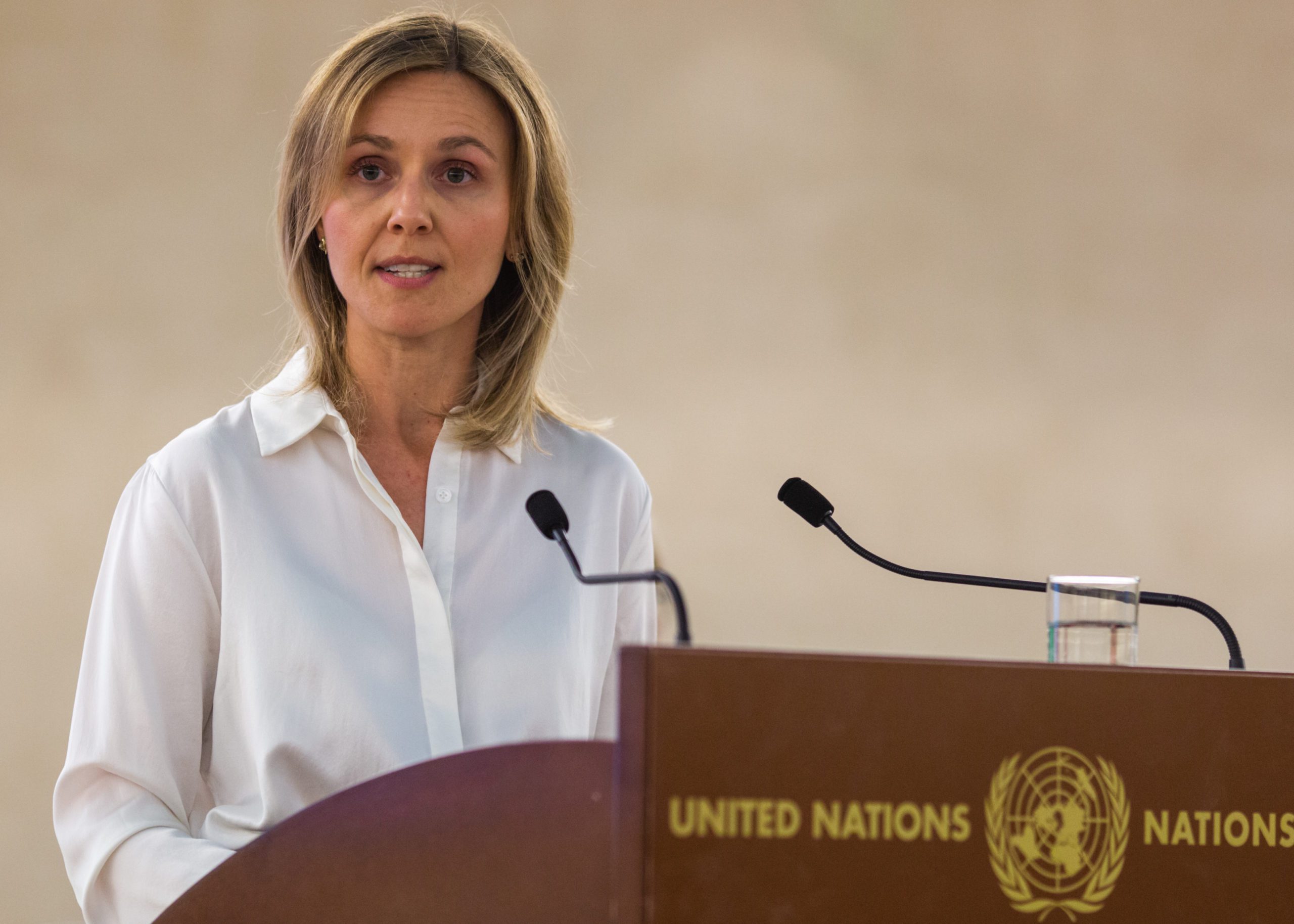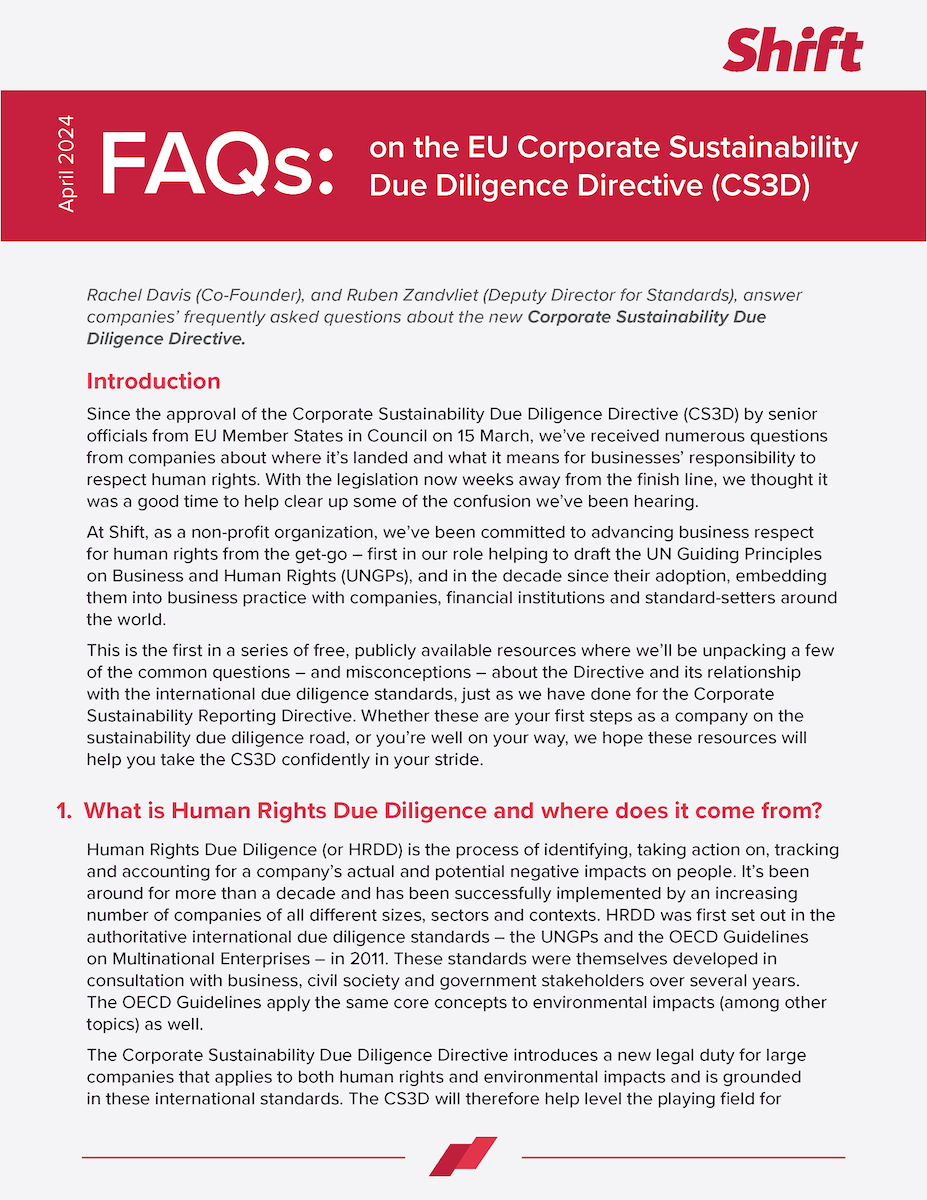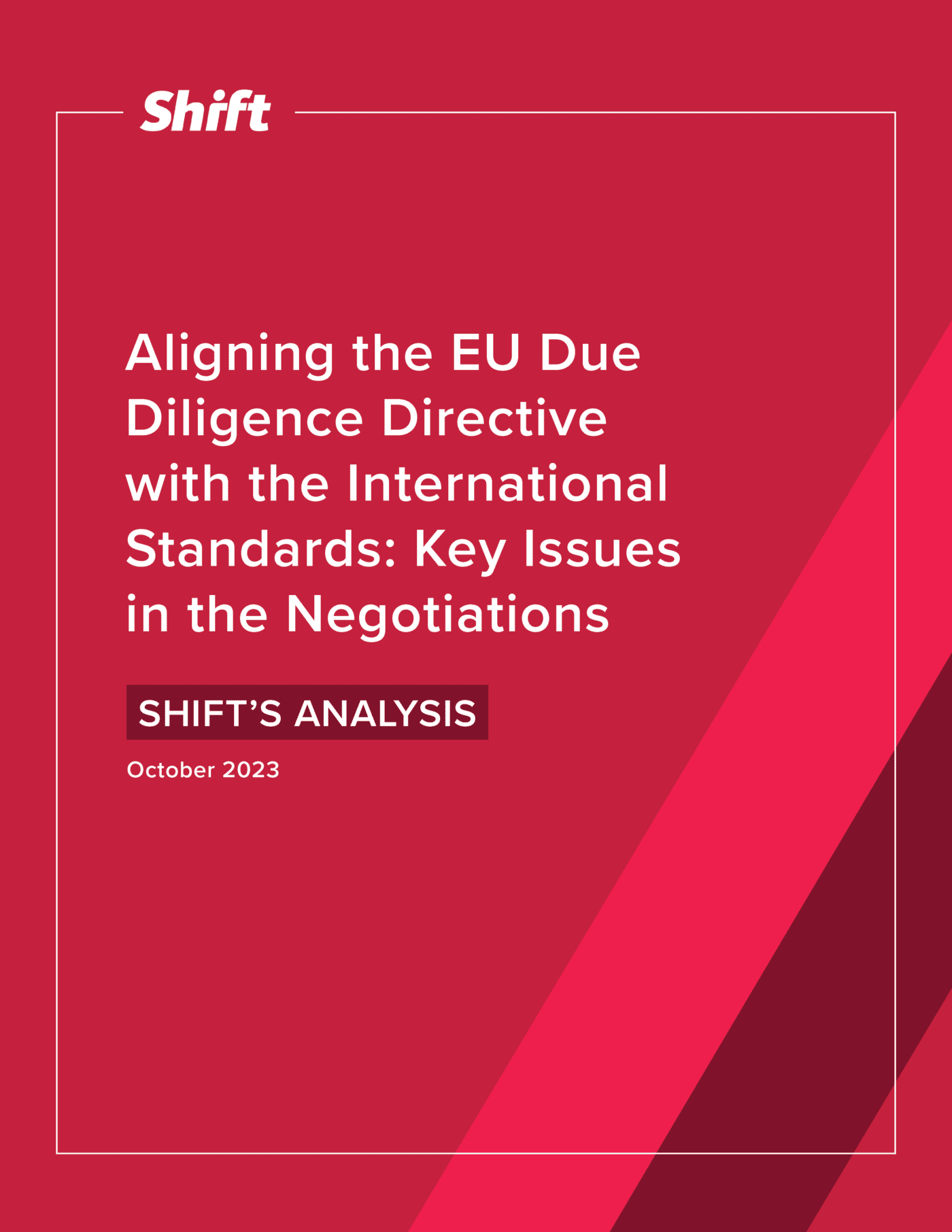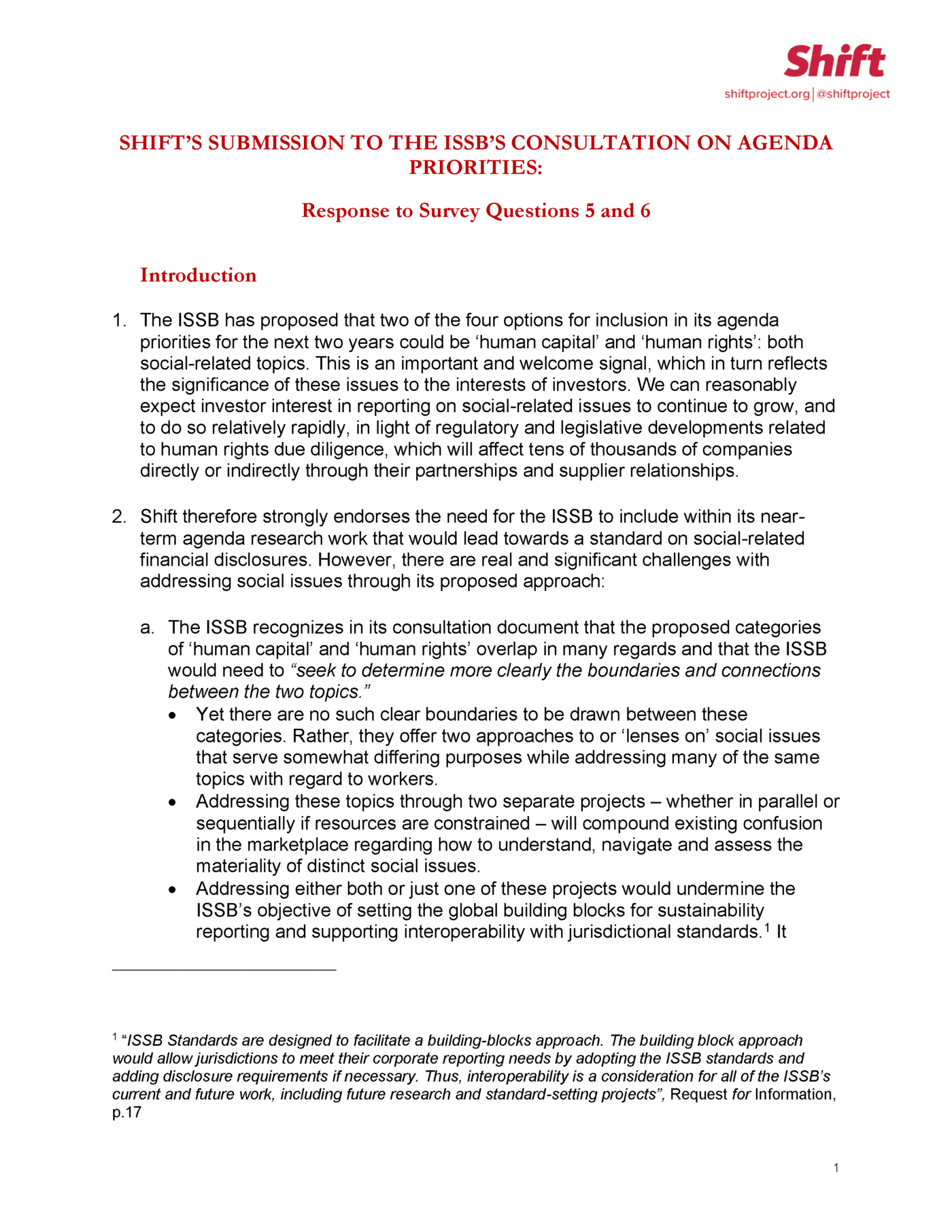As a senior legal advisor to former UN Special Representative John Ruggie during his mandate, Shift’s Rachel Davis played a key role in the drafting process of the UN Guiding Principles on Business and Human Rights. Seven years into the implementation of the UNGPs, she reflects on the relevance of mandatory measures in the State Duty to Protect and the growing debate around comprehensive mandatory human rights due diligence legislation.
For more, see Shift’s full statement: Fulfilling the State Duty to Protect: A Statement on the Role of Mandatory Measures in a “Smart Mix”
- Pillar I of the UNGPs focuses on the role that states should play in fostering business respect for human rights. What is the role of mandatory measures in meeting that responsibility?
The UNGPs always envisaged that mandatory measures by states – at both the national and international levels – would be part of their implementation. It’s right up front in Guiding Principle 1, which says that states must have effective legislation and regulation, as well as policies and other measures, to protect against human rights harms by businesses. It’s also in the definition of the “smart mix” of measures that is needed under Guiding Principle 3 to meet the state duty in practice. Yet we often hear the term “smart mix” being used to really just mean voluntary measures. That’s a misreading of what the UNGPs say.
When we were developing the UNGPs, there were already relevant laws on the books in many states that made aspects of the corporate responsibility to respect human rights mandatory, like workplace health and safety legislation, environmental legislation, privacy protections and so forth. In the last few years, we’ve seen a growing number of legislative initiatives, including those aimed at introducing comprehensive human rights due diligence as a requirement for companies, helping to drive more effective implementation of the UNGPs. - So, does that mean that all states should implement comprehensive mandatory human rights due diligence legislation as part of a “smart mix” of measures?
A smart mix is exactly that – the right combination of mandatory, voluntary, national and international measures that is needed to effectively foster business respect for human rights in a particular context.
At the national level, that is going to look different in different countries, depending on what currently exists, how effective it is in practice, and what can be done to address the gaps. The UNGPs don’t require states to implement comprehensive mandatory human rights due diligence regimes, but as we explain in our statement on this topic, they are clearly in line with the UNGPs and there are positive reasons for states to consider them.
I think many stakeholders hoped that National Action Plans (NAPs) on the UNGPs would be a vehicle for states to proactively explore tailored mandatory measures. And it’s true that some NAP processes have provided important moments for governments to engage business and civil society stakeholders, bringing everyone around the table. But in terms of new measures, particularly mandatory measures, most NAPs have ended up just cataloguing what currently exists in a specific context, rather than identifying what more might be needed. - What about binding international measures? Do the UNGPs expect states to use those too?
Mandatory international measures are part of what the UNGPs mean by a smart mix. In my view, it’s only natural, and entirely predictable that the appropriate role of binding international measures should be actively considered as part of effective implementation of the UNGPs. Indeed, when John Ruggie presented the UNGPs to the Human Rights Council in 2011, one of his five follow-up recommendations specifically called for the development of a new international instrument. It was the only one that wasn’t taken up.
At Shift, we’re paying close attention to the discussion of the “Zero Draft” treaty. We are very interested in exploring how a binding instrument could drive the most meaningful change in state practice in this area. - Some laws have been criticized for incentivizing a tick-box approach by business to human rights risks. Don’t mandatory measures just lead to more compliance-based thinking that goes against how the UNGPs are trying to change company mindsets?
States have had to tackle this challenge in other areas of law that aim at changing company behavior like anti-corruption or health and safety, and there are plenty of lessons to learn from what has and hasn’t worked in those areas. It certainly requires up-front thought about who within the state is going to have the capacity and expertise to oversee the legislation, and assess whether its expectations are being met. Authoritatively calling out what meaningful compliance looks like, and what is merely superficial, is an important element in making such legislation effective in practice. And for it to be authoritative, the state needs to be playing a role in making these assessments. - Some have suggested that stringent laws can have perverse consequences, leading companies to avoid high-risk contexts, or to disengage rather than seek to influence high-risk suppliers, as a way to avoid liability. What is Shift’s perspective on this?
The UNGPs are trying to shift companies’ response to high-risk contexts or suppliers from one that seeks to manage risk to the business alone – by not investing in challenging contexts, or by immediately terminating relationships when human rights harms are found – to a more thoughtful approach that is driven by consideration of risk to people. This is why the quality of a company’s human rights due diligence matters. Legislative and regulatory regimes need to allow companies the space to show that they genuinely tried to use leverage creatively and consistently to address a situation. Legislation should also be designed to incentivize companies to put in place more robust internal processes for deciding to divest or withdraw from a relationship – processes that consider the severity of the impacts involved, and whether there could be additional harm to people from a decision to disengage. - Another specific risk that’s been raised is whether legislation could lead to companies reducing the scope of their human rights due diligence to the scope of their liability for impacts. Is this risk real?
The scope of due diligence expected under the UNGPs is likely to always be broader than the scope of legal liability for impacts a business is connected to. It’s true that the leading model of comprehensive mandatory human rights due diligence that has been enacted to date – the French Duty of Vigilance law – takes a narrower approach to the scope of due diligence, focusing it on those business relationships that could also give rise to liability. It will be very interesting to see whether companies limit their vigilance plans and their due diligence solely to the relationships covered under the Act, or whether they maintain a broader scope. We will be assessing how this plays out in practice against the baseline evaluation of French companies’ human rights reporting that we published last year.
The mandatory human rights due diligence proposal (or ‘popular initiative’) in Switzerland takes a different approach. It proposes that the scope of due diligence should be broad (throughout the value chain, as in the UNGPs) but that liability should only attach to harm caused by certain controlled entities like subsidiaries. We’ve been actively supporting the debate on the proposal in Switzerland for over 18 months now, through our engagement with both business and civil society partners and allies, and will continue to do so. - Are there specific elements that all states should consider when drafting legislation that includes aspects of mandatory human rights due diligence? Are there good practices – or issues to watch out for – that states could learn from?
Absolutely. We’ve already seen how important it is to provide clarity on key terms to ensure that they correspond to what businesses -and their stakeholders- are expected to do under the UNGPs. For example, don’t just use the term “supply chain”, which many companies may give a narrow meaning to, but clearly define it to include the full value chain connected to a company’s operations, products or services. We already see a difference in how the Australian Modern Slavery Act (MSA) handled this point, compared to the UK Act’s approach. In Australia, we had the benefit of learning from what hadn’t worked with the original MSA.
States will also want to consider how to avoid drafting legislation that facilitates action only at corporate headquarters and not at the operational or country level, or that creates perverse incentives for companies to avoid engaging publicly about human rights risks due to fears of liability. That’s not helpful for anybody.
This whole area concerning legislation as a part of a smart mix is one we’re going to be doing a lot more thinking about at Shift as the examples of mandatory human rights due diligence proliferate – and we look forward to sharing our thinking widely over the coming year.
Read our full statement: Fulfilling the State Duty to Protect: A statement on the role of mandatory measures in a “smart mix” when implementing the UNGPs

 By Rachel Davis
By Rachel Davis



